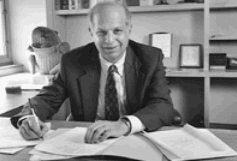|
|
|
|
|
|
|
News & Views item - June 2013 |
![]() Marc Kirschner Slams A Perverted View of "Impact". (June 14,
2013)
Marc Kirschner Slams A Perverted View of "Impact". (June 14,
2013)
Science's first solicited editorial following the installation of Marcia McNutt as the journal's editor in chief, A Perverted View of "Impact", is contributed by Marc Kirschner, the chair of the Department of Systems Biology, Harvard Medical School.
It's noteworthy that Professor Kirschner in his contribution refers to Huda Zoghbi author of Science's January 18, 2013 editorial: "[S]cientists must challenge the assumption that translation, rather than fundamental understanding, is the choke point of progress in the application of science to societal problems."
Some excerpts:
 [T]he
U.S. National Institutes of Health has elevated “significance” to an explicit
criterion in funding decisions. It requires that grant reviewers write a
paragraph on “impact,” which it defines as the likelihood that the proposed work
will have a “sustained and powerful influence.”* Especially in fundamental
research, which historically underlies the greatest innovation, the people doing
the work often cannot themselves anticipate the ways in which it may bring human
benefit. Thus, under the guise of an objective assessment of impact, such
requirements invite exaggerated claims of the importance of the predictable
outcomes—which are unlikely to be the most important ones. This is both
misleading and dangerous.
[T]he
U.S. National Institutes of Health has elevated “significance” to an explicit
criterion in funding decisions. It requires that grant reviewers write a
paragraph on “impact,” which it defines as the likelihood that the proposed work
will have a “sustained and powerful influence.”* Especially in fundamental
research, which historically underlies the greatest innovation, the people doing
the work often cannot themselves anticipate the ways in which it may bring human
benefit. Thus, under the guise of an objective assessment of impact, such
requirements invite exaggerated claims of the importance of the predictable
outcomes—which are unlikely to be the most important ones. This is both
misleading and dangerous.
One may be able to recognize good science as it happens, but significant science can only be viewed in the rear-view mirror. To pretend otherwise distorts science.
What is now promoted as high-impact science is usually a narrow extension of existing experimental designs in a program focused on a set of feasible goals. Fuzzy new directions that might fail, but could open up major new questions, are often dismissed as too speculative and considered low-impact... biochemical investigations and research on non-mammalian systems [tend] to be treated as intrinsically less valuable than studies on human cells. As a result, biomedicine is losing the historically productive cross-fertilization between model systems and human biology.
Focusing resources narrowly on areas that are deemed impactful, while ignoring many others, decreases diversity, making science less productive.
Scientists are failing to live up to the trust society has placed in them. The scientific community must create leadership with the courage and independence to take control of the structure of its training, the peer-reviewing of its journals, the organization of grant review panels, and the overall priorities that are set. There are strong political, economic, and institutional interests that are not shy about asserting themselves. Scientists have to be equally assertive and even more persuasive.
[And finally, scientists] should re-emphasise humility, banishing the words “impact” and “significance” and seeing them for what they really are: ways of asserting bias without being forced to defend it.
________________________________________________________
* http://grants.nih.gov/grants/peer/guidelines_general/impact_significance.pdf.